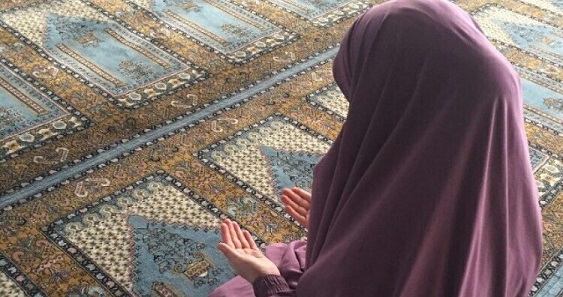Hello and lets bust a VERY common myth, that seems to be on the rise these days, AGAIN.
MENSTRUATING WOMEN CANNOT FAST OR PRAY BECAUSE PERIOD BLOOD IS GROSS.
How many of us have been looked at with disgust when trying to pray (Tasbeeh and Dhikr) by our aunts and cousins ? That look of absolute loathing, repulsion – like if you were to touch them they would explode. (LOLOL)
This kind of thinking isn’t much of a problem tbh, ‘cuz the people with it are gonna die in what like 20 more years ? Why this becomes a problem, is that it influences how people of the younger generation think.
So lets talk about the real issue. Everybody knows, there is truth in the fact that a woman on her period cannot pray or fast. The problem arises with how to phrase it.
Should it be, Muslim women are not allowed to, or should not, are not expected to, or are simply exempted from it ?
The base of a Muslim prayer is an activity preceding the prayer – the ablution or the Wudhu. This act consists of a comprehensive washing of the hands, feet and face, and is a REQUIREMENT before EVERY prayer. And there are certain things that invalidate the wudhu – Pooping, peeing and farting, for the most part. These are the three most commonly known things that invalidate your wudhu. But there is a fourth, less commonly known thing that does the same – bleeding.
When I say bleeding, I don’t just mean the vaginal kind. ANY bleeding, from ANY gender, invalidates the Wudhu. So if a man scraped his ear against something, and this caused blood to FLOW, he would have to redo wudhu. Not doing so will invalidate his existing wudhu, thereby rendering his prayers invalid.
Bleeding/flowing blood – cause for nullification of Wudhu. No Wudhu – cause for nullification of prayer. {We do wish to mention that IF the blood stays stagnant, or is not in enough quantity to flow, wudhu does not become invalidated.}
A BIG condition of fasting is prayer. If a faster misses a prayer, his fasting is in danger. There are two reasons for why a woman cannot fast in Ramadan if she is on her period ;
- She cannot make wudhu, which means she cannot pray, which means she cannot fast.
- It is a sign of mercy from God, because a woman on her period needs food and water.
A woman on her period is FORGIVEN her prayer, meaning she does not have to make up for it when she is off. A woman on her period has to however make up for the fasts she missed when on.
For a detailed list of things that invalidate wudhu : Musliminc ; Questions on Islam
Disclaimer – This post is my production after adequate research. I do not claim to be 100% correct and humbly accept any faults in my interpretations. Only Allah knows best. If you have any suggestions or would like to further discuss this, please leave a comment or email me.
Any images used are not mine, and taken off the internet. Due credit to those who put work into the make of them.
Sources : Questions on Islam ; My Religion Islam ; Alukah.netIslamqa ; Musliminc

Very good post👌..
However, all mathaahib aren’t the same, e.g., in the shafi’i Mathab, blood does not break wudhu.
AwesOme perspective though 🌸
LikeLiked by 1 person
Thank you so much for reading. And thank you so much for bringing this up, I was not aware of this about the Shafi Mathab. But then I don’t believe in the segregation of mathabs this way either. For me, they are all equally correct in their own ways, Mashallah.
I did a little more research about what you said, and you are right. This is a matter of difference amongst the scholars. May Allah guide us to the right path. 🙂
LikeLike
Totally yes. Each one of them are authentic because it is based on Qur’an and Sunnah etc., just differently interpreted or understood by the four scholars..so either one of the 4 you follow, you’ll be correct, on the right path💯✔
Ameen! 🌹
LikeLike
There is no prohibition on women praying or fasting or touching the mushaf of entering the masjid etc. during menstruation.
Actually, the question of menstruation was something brought up to the prophet by his companions, as recorded in the Quran (2:222). Probably they wanted to confirm their traditions with a long list of prohibitions. Surprisingly (for them), God asked the prophet to respond with only one prohibition … to keep away from sexual intimacy with their women. If there were any other prohibitions, surely the prophet would have been instructed to list them too, but he was not.
These are random rules made up by fuqaha in the 8th to 10th centuries, reviving the jahiliyya of the pre-Quranic past. There is no reason to subject menstruating women to this indignity, of isolation, and repulsive looks by aunties, cousins and society. Recently I dropped off my sister at a masjid for Friday prayers (in the US). If was winter, and chilly weather. It was late, and the khutbah had already started. There was one lone woman standing outside by herself, waiting in the cold. I instantly knew why she had to endure the cold temperature outside the masjid, and not allowed to enter. Everyone who saw her knew, and she knew that they knew. I felt sorry for her, and for the rules created by these ulama that subject her to such a treatment. When I drove away, I realized that there was little I could do.
LikeLike